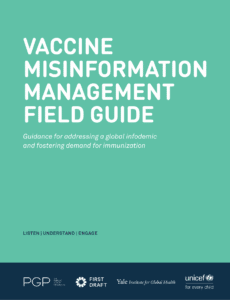Misinformation Alerts
Knowing what misinformation is being shared can help you generate effective messaging.
These insights are based on a combination of automated media monitoring and manual review by public health data analysts. Media data are publicly available data from many sources, such as social media, broadcast television, newspapers and magazines, news websites, online video, blogs, and more. Analysts from the Public Good Projects triangulate this data along with other data from fact checking organizations and investigative sources to provide an accurate, but not exhaustive, list of currently circulating misinformation.
Misinformation Alerts
Knowing what misinformation is being shared can help you generate effective messaging.
These insights are based on a combination of automated media monitoring and manual review by public health data analysts. Media data are publicly available data from many sources, such as social media, broadcast television, newspapers and magazines, news websites, online video, blogs, and more. Analysts from the Public Good Projects triangulate this data along with other data from fact checking organizations and investigative sources to provide an accurate, but not exhaustive, list of currently circulating misinformation.Alerts are categorized as high, medium, and low risk.
- High risk alerts: Narratives with widespread circulation across communities, high engagement, exponential velocity, and a high potential to impact health decisions. Are often more memorable than accurate information.
- Medium risk alerts: Narratives that are circulating in priority populations and pose some threat to health. Potential for further spread due to the tactics used or because of predicted velocity. Often highlights the questions and concerns of people.
- Low risk alerts: Narratives that are limited in reach, don’t impact your community, or lack the qualities necessary for future spread. May indicate information gaps, confusion, or concerns.
A White House email that unintentionally contained outdated mask guidelines has sparked conversations about the effectiveness of wearing masks to protect against COVID-19. The email about an upcoming event at the White House stated that unvaccinated individuals are required to wear masks and socially distance at the event. Right-wing commentators referred to mask requirements as “insanity,” “propaganda,” and “useless.” A correction email was sent out shortly after the first, clarifying that masks are no longer required at the White House.
Recommendation: Misinformation about the effectiveness of wearing masks has circulated since the earliest days of the pandemic. Many anti-mask advocates have seized on a review published earlier this year to support their opposition to masks and mask mandates. Emphasizing that the analysis relied on limited evidence due to the lack of high-quality randomized controlled trials of mask effectiveness against COVID-19 is recommended. Debunking messaging may emphasize that the largest randomized trial of mask effectiveness against COVID-19 found a significant reduction in COVID-19 infections in people who consistently wore masks. Fact-checking sources:
A far-right news site known for publishing vaccine misinformation and conspiracy theories claims that several autopsies confirm that COVID-19 vaccines cause sudden death related to myocarditis. The claim is based on a Korean study that found that, among the over 44 million vaccinated people in the country, eight died from what is believed to be vaccine-related myocarditis.
Recommendation: The persistence and widespread nature of misinformation about myocarditis increase its risk level. Debunking messaging may explain that the study clarifies that there is not enough evidence to verify that the individuals’ deaths were vaccine-related. Continuing to emphasize that many studies, including this one, have found that vaccine-related myocarditis is very rare, typically mild, and usually resolves quickly is recommended. Fact Checking Source(s): USA Today, FactCheck.org 
In a trending video clip, an osteopathic doctor and COVID-19 conspiracy theorist repeats the debunked myth that the tetanus vaccine contains an ingredient that causes sterility in women as part of a depopulation plan.
Recommendation: The rumor that the tetanus vaccine was used to sterilize Kenyan women has circulated since the 1990s based on a widely disseminated false claim that the vaccine contains the pregnancy hormone HCG. Debunking messaging may explain that multiple studies over the last three decades have determined that the tetanus vaccine doesn’t contain HCG or any other sterilizing ingredients and that the vaccine is safe to receive before or during pregnancy. Fact Checking Source(s): Lead Stories, Full Fact 
A social media account that claims to report “breaking news” recently promoted the false rumor that mRNA COVID-19 vaccines contain cancer-causing DNA. The post does not link to a source for the claim, but it appears to have originated in a video hosted by a conspiracy theory-promoting physician.
Recommendation: Widespread myths that mRNA vaccines alter DNA or cause cancer have circulated since COVID-19 vaccines were rolled out in late 2020. The persistence of this misinformation increases its risk. Debunking messaging may explain that mRNA vaccines do not interact with or alter DNA and that there is no link between any COVID-19 vaccine and cancer risk. Continuing to emphasize that COVID-19 vaccines have been shown to be safe is recommended. Fact Checking Source(s): MD Anderson Cancer Center, USA Today 
A far-right news site published an article that repeated the false claim that COVID-19 vaccine boosters weaken the immune system. The article has been shared thousands of times on social media.
Recommendation: The persistence of the claim and its potential to cause hesitancy increases its risk. The myth that COVID-19 vaccines and boosters weaken the immune system has circulated for years, with no evidence to support it. Debunking messaging may emphasize that vaccines do not negatively affect immune cells or the immune system as a whole. Instead, they strengthen the immune system’s ability to fight COVID-19. Fact Checking Source(s): FactCheck.org, Reuters
The producers of a viral conspiracy film that falsely claimed COVID-19 vaccines cause people to die suddenly released a trailer for a second, equally unsubstantiated “documentary.” The new film repeats several conspiracy theories, including that COVID-19 vaccines are bioweapons, that governments planned the pandemic to control people, and that SARS-CoV-2 was developed by pharmaceutical research.
Recommendation: The first film had a lasting impact on anti-vaccine narratives, which increases the potential risk of the new film. Debunking messaging may emphasize that the trailer for the new film, like the original, is full of misleading quotes, misrepresentations, and blatant lies. The claim that the vaccines are bioweapons is based on an interview with a Pfizer “whistleblower” who didn’t work in vaccine research. There is no evidence to support the conspiracy theory that governments or pharmaceutical companies were involved in the COVID-19 pandemic. COVID-19 is caused by a coronavirus, a family of viruses that caused multiple major outbreaks in the two decades leading up to the pandemic. Continuing to emphasize that over 70 percent of the world’s population has been safely vaccinated against COVID-19 with no evidence of widespread health issues is recommended. Fact-Checking Source(s): 
Social media posts in multiple languages are recirculating the conspiracy theory that a WHO pandemic treaty allows the organization to impose lockdowns, vaccine requirements, and quarantines on countries. Several large-follower accounts have repeated the claim.
Recommendation: The persistence of the false claim increases its risk. This misinformation has been circulating since WHO announced negotiations for a global “pandemic prevention, preparedness, and response” agreement. Debunking messaging may explain that the treaty is voluntary and doesn’t grant WHO authority over national policies. Instead, the document, which hasn't been ratified, is a list of recommendations for international pandemic preparedness. Fact Checking Source(s): Logically, AFP, FactCheck.org
An FDA study of over 3 million children confirmed that COVID-19 vaccines are safe for children and adolescents aged 5 to 17. The study found a slight increase in myocarditis risk in older children the week after vaccination, primarily in boys aged 12 to 17. Anti-vaccine sites falsely claim that the study proves vaccines are unsafe for children.
Recommendation: The widespread nature of the misinformation elevates its risk. Debunking messaging may emphasize that, of the 153 myocarditis and pericarditis cases reported in older children, most resolved quickly, and none were fatal. No safety concerns were identified for children under 12. Like previous studies, this study confirms that serious risks from COVID-19 vaccination are extremely rare. Emphasizing that the risk of heart issues is significantly higher in every age group after COVID-19 infection than after vaccination is recommended. Fact Checking Source(s): CIDRAP, Forbes
Posts trending in multiple languages claim that a WHO study found that COVID-19 vaccines cause multiple sclerosis (MS), a disease in which the immune system attacks nerve cells. The posts include screenshots of the study falsely attributed to the WHO website.
Recommendation: The misinformation was promoted by several popular accounts with large audiences, increasing its risk. Debunking messaging may emphasize the study was never peer-reviewed and wasn't conducted, funded, or endorsed by the organization. The research is a case report presented at a conference, which describes two vaccinated people, out of billions, who were diagnosed with MS. It does not provide any evidence that COVID-19 vaccination causes MS. Fact Checking Source(s): AP News
An article circulating on social media claims that childhood vaccines are the primary driver of the so-called "autism epidemic." The article falsely claims 100 “top scientists” agree that vaccines cause autism. The source of the claim appears to be an anecdote from a blog post authored by a tech entrepreneur and anti-vaccine conspiracist.
Recommendation: The myth that vaccines cause autism is widespread and persistent, hence the high risk. Debunking messaging may emphasize that scientists have investigated a potential link between vaccines and autism for decades and have never found evidence to support any connection. The study that originally claimed that vaccines cause autism was retracted after it was found to involve unethical research practices. No subsequent studies have found a causal link between any vaccine and autism. Fact-Checking Source(s): 
Alerts are categorized as high, medium, and low risk.
- High risk alerts: Narratives with widespread circulation across communities, high engagement, exponential velocity, and a high potential to impact health decisions. Are often more memorable than accurate information.
- Medium risk alerts: Narratives that are circulating in priority populations and pose some threat to health. Potential for further spread due to the tactics used or because of predicted velocity. Often highlights the questions and concerns of people.
- Low risk alerts: Narratives that are limited in reach, don’t impact your community, or lack the qualities necessary for future spread. May indicate information gaps, confusion, or concerns.
Vaccine Misinformation Guide
Get practical tips for addressing misinformation in this new guide. Click image to download, or see highlights.

